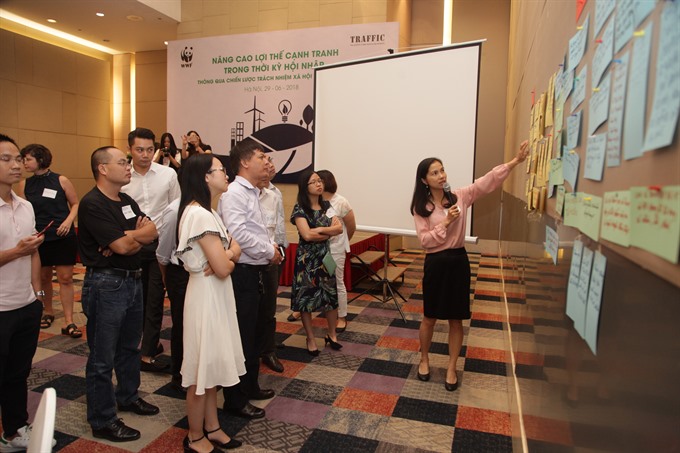 Society
Society

Staff from 30 Vietnamese and Germany companies met at a workshop last weekend in Hà Nội organised by TRAFFIC to learn the benefits of adopting a zero-tolerance policy on wildlife crime.
 |
| Staff from 30 Vietnamese and Germany companies met at a workshop last weekend in Hà Nội organised by TRAFFIC to learn the benefits of adopting a zero-tolerance policy on wildlife crime. — VNS Photo Hoàng Nam |
HCM City — Staff from 30 Vietnamese and Germany companies met at a workshop last weekend in Hà Nội organised by TRAFFIC to learn the benefits of adopting a zero-tolerance policy on wildlife crime.
Taking a public stance against buying, gifting and consuming wild animals could make their companies more competitive, workshop leaders said.
“Wildlife trafficking is transnational by nature and has repercussions that are felt worldwide. It is an issue that resonates with the German people and we are pleased with this opportunity for German and Vietnamese companies to join together and spread a united message against this crime,” said Katharina Trump, anti-poaching programme manager at the World Wide Fund for Nature (WWF)-Germany.
During the workshop, participants learned how to enact a corporate social responsibility (CSR) policy to attract ecologically-minded clients, increase competitiveness, and mitigate potential risks.
The workshop featured sessions on how to construct meaningful messages using CSR activities that could combat wildlife crime and lead to a change of practices among their colleagues and customers.
Adopting these policies could strengthen the reputation of their businesses by ensuring they are not inadvertently participating in wildlife crime.
“In this age of global integration, Vietnamese companies are expected to accept their stakeholder responsibilities and societal obligations along with their shareholder wealth-maximisation goals,” said Lương Tú Anh, managing director of Mắt Bão - Northern Area, one of the presenters at the workshop.
The event was the latest in a series organised by TRAFFIC with different companies and civil society organisations, including the Việt Nam Chamber for Commerce and Industry (VCCI), Việt Nam E-Commerce Association, and Việt Nam Automobile Transportation Association.
The aim is to work towards the eradication of animal trafficking by encouraging companies to take a strong position against wildlife crime.
TRAFFIC’s efforts to encourage companies to integrate wildlife protection into their CSR activities have spanned the business, tourism and hospitality sectors.
As a result, anti-trafficking messaging has been placed on buses, websites, at events, and on other platforms, reaching around 250,000 people.
Following the workshop, companies were given CSR toolkits to help them develop an effective integrated CSR policy against wildlife crime. — VNS